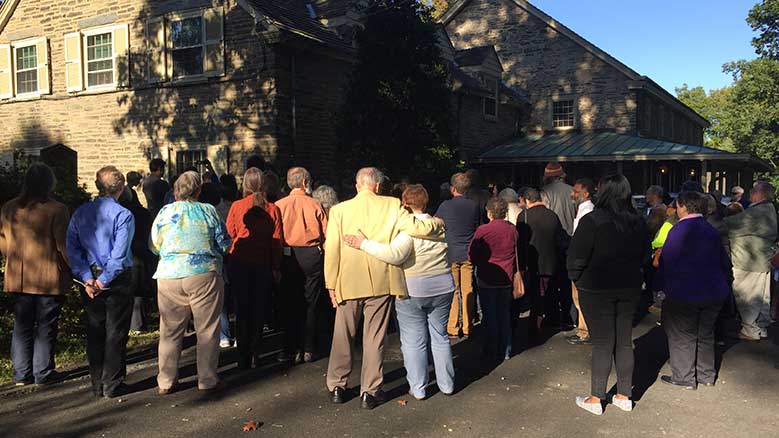
Read also:
[contentcards url=”https://www.friendsjournal.org/memorializing-friends-african-descent/”]
In 2015, the Quaker project Honoring Those Known Only To God (the Honoring Project) convened itself for the first time. It brought together a multiracial, class-diverse group of Friends who want to remember the lives of nearly forgotten African Americans, both Quaker and non-Quaker, buried in Quaker burial grounds. So many of these graves are unmarked, and therefore go unrecognized and stay unseen. These were and are Children of God. And even when the names of those buried are known, they stay unnamed in many meetings. This is likely due to the early Quaker practice of not having headstones. The continued erasure in particular of these individuals of African descent, and the unwillingness by some to devote time, funds, or energy to correcting or updating a small, significant piece of history is in part due to unintended racism among Friends.
The Honoring Project addresses that erasure of recognition by first asking Quaker meetings and Friends churches to question if such graves exist; if so, to add them to our new database and above all, to honor and protect these burial sites (https://bit.ly/2016surveyHonoringProjectUGRR). To this end, the Honoring Project’s committee works with Quaker communities wishing to memorialize these freed and fugitive African Americans. The Honoring Project makes itself available to guide modern-day Friends on how to honor, celebrate, and center the lives of African Americans who sought and fought for freedom, some who may have sought shelter while fleeing, others who were no longer fugitive and may well have been part of the life and blood of our meetings. By including in the database any discovered names and details of these individuals may help African Americans in their genealogy research.
These historic heroes were never mourned, never had their voices heard, or their place in history truly recognized. They deserve to be remembered and commemorated. The forced separation and sale of men, women, and children was the one of the most harmful experiences of American slavery.
—African American member of the committee
“From the records of my white ancestors that were handed down to me, I know a great deal about their history as abolitionists. They were Quaker potters in Chester County [Pennsylvania], active in the Underground Railroad, and two were members the AntiSlavery Society. But I don’t know anything about the people who passed through their home and pottery factory on the way to freedom. As I learn more about the lives of my ancestors, I want to know as much about the freedom seekers who risked so much on their journeys. The project is a way of making those connections and helping to bring the names and stories of these freedom seekers to light.”
—white committee member; emphasis added
All photos: 2016 memorial service at Abington (Pa.) Meeting. © Tricia Coscia.
Moving Toward Healing. Since 2013, at least two Quaker meetings in the eastern United States have already held meetings for worship for memorial for those buried without recognition, centering on black lives, known and unknown. Other Quaker communities are considering doing the same.
Members of the Honoring Project’s committee have assisted certain meetings in their preparations and in their commemorations. From such experiences has come great learning, both on the part of the committee and on the part of the Friends community that has hosted these memorials and dedications. As a result, the Honoring Project is presently drafting recommendations on how to prepare for and carry out a community-based culturally appropriate meeting for worship for memorial. There is a need to decenter whiteness in this process. There is a need to invite, include,and welcome nearby nonQuaker communities of color.
The Honoring Project has gained clearness that this work amongst Friends is needed to honor and repair harm done to African Americans suffering enormous hardship due to institutional racism. It is also to honor their ancestors, and to name and accept responsibility for racist acts carried out by U.S. Friends of European descent from hundreds of years ago and from today. Through the honoring and the naming, we as Friends may begin to heal our present situation.
The Honoring Project recognizes the need to end the Friendly silences that keep hidden the racism that exists in American Quaker history and in today’s worship spaces. Today’s Friends must name the presence of Quaker slaveship builders that were part of our early worship communities; Friends must be willing to challenge meetings that have kept tight purse strings unnecessarily when it comes to funding events led by, or ministries held by, people of color. If there are unfriendly glances from white Friends toward visitors and attenders of color at worship, there is unexamined implicit bias that must be named, unpacked, and illuminated. Corporate silence and aversion has not shed God’s love on these wounds; perhaps bringing them into the Light and accepting responsibility for them will.
“When I was a child, every now and then a family member showing home movies or a teacher would delight us by showing films in reverse. It was fascinating to watch backwards motion, and to imagine that one could relive happiness. [But we cannot] unwind terror, such as the violence against people of color that persists to this day… [No] matter how much you rewind the film, you can’t change what has already happened. No amount of apologizing can undo the suffering caused by violence, white supremacy, and oppression. Like the films of our past, the films of our present actions will only show what we did or did not do, not our intentions, ideas or apologies.”
—white member of the committee
White Friends Work. Racism is real even if race itself is a madeup construct. Racism is learned; so is whiteness. If it is learned, then it can be unlearned. The Honoring Project calls on white Quakers to do this work of unlearning, earnestly and intentionally. Racism is in our history and in our very midst: it is not to be denied. White Quakers must lean into it, and not shy from it. Racism and whiteness affect our inward divinity, our being, our wholeness, regardless of our skin color. It robs us of our shared humanity; it has the potential to keep us separate and to undermine our trust of one another. Our intellectual awareness of racism in and of itself does not disrupt systemic racism.
By “racism,” we do not mean only the type of blatant violence carried out by the KKK or by the Bull Connors of the world; nor do we mean the racist discriminatory lending policies and real estate practices that put into place redlining and restrictive covenants in residential areas of major cities.
Within The Honoring Project committee, the kind of racism we are learning about amongst Friends is more subtle—the type that pervades formal policies and informal practices, the kind that unintentionally dismisses the upset that Friends of color voice when feeling unwelcome, unheard, unseen, unrecognized in meetings, on Quaker committees. Unacknowledged racism and socialization into whiteness will continue to affect our Friends meetings, churches, and worship communities until white Friends intentionally choose to listen, respond, and act differently.
The Honoring Project works to make these concerns more visible among U.S. and Canadian Friends, and to repair harm done. Thankfully, our work is one piece of many: Quakers have standing and ad hoc committees for racial justice, and convene discussion groups on things like TaNehisi Coates’s or Debby Irving’s recent writings. These are just two examples; many more activities exist within and beyond our Quaker walls. White Friends are becoming more awake to how white supremacy has birthed the United States (we recommend the documentary, The Doctrine of Discovery and the book and video by Jacqueline Battalora, The Birth of A White Nation). White Friends are seeing more clearly how unexamined racial bias both individually and in our Quaker communities continues to leave its harmful mark on the bodies, minds, spirits, and hearts of Quakers and people of color.
It is not possible rewind the film to start over, nor unwind the tragic violence nor take back the cutting microaggressions against people of color. But white Friends can pay attention, can affirm and believe Friends of color when Friends of color voice how unexamined bias in Quaker practices hurts them. White Friends can accompany and support Friends of color in the pursuit of fairness and justice. White Friends can be more active, show up at events related to movements for justice, for Black lives and immigrant lives and indigenous lives and Muslim lives of color in particular.
Modern-day Friends can follow the leadership and vision offered by Friends and nonFriends of color. White Friends can pray for direction, for God’s guidance where Way is open, for forgiveness, for Love to prevail. White Friends can act their parts differently so that the films of the future reflect a different chosen path. White Friends can renew personal commitments to equality by taking bolder steps as allies, accomplices, comrades—anything but remaining silent bystanders with good intentions.
“This project has helped me dig much deeper into my country’s history, my neighbors’ histories, and my own personal history. During public events and private conversations, we have had the opportunity to hear about different experiences of racism the daily affronts that can flood and overwhelm a person. I hope that in some way, our witness has provided these teachers with a measure of support and respect that they so rightfully deserve. And that, in our own ways, we can integrate this new understanding into our daily lives and the community around us.“
—white member of the committee
Whiteness and wealth. As Friends committed to justice and equality, we must recognize that much of white Quaker wealth was gained by, and many of our meetinghouses were built with, money profited from having enslaved human beings, and white privilege. Some meetinghouses were built with the strength and skills of those in slavery as well as those free of slavery. Where do our meetings and Friends churches spend this money? How much goes to organizations led by people of color? Who do we deem worthy of receiving our donations and why? What is a “worthy cause” and what isn’t? Who gets to decide?
As Friends, we must also look very seriously at racism and classism in a broad economic context. Who is advanced in our economic system and who is left behind? We must have more buy-in from people to explore and unpack widespread social class differences as well as invisible oppression based on social class. Classism and racism intersect with each other and reinforce each other.
When we, as modern-day Friends, describe historic Quaker efforts to end slavery, we must also recognize the complexity of our past. Historic Quakers, early Friends, were also freed and fugitive Americans of African descent. Historic Quakers, early Friends, were slaveholders as well as abolitionists. And the first U.S. abolitionists were not Friends of European descent. They were of African descent: they were fighting for their lives and for freedom every day.
“Our meetinghouses have been shared by those in hiding as well as those no-longer fugitive. Shared by those held in bondage by Quakers, as well as those free of bondage. Children, adults, married, single; with family, separated from family; with means, without means; having access to education, deprived of education; treated well, treated poorly; respected, disrespected; living long lives, short lives; bearing chosen names, named by given names. We must not shy from the fact that some Quaker founders were slave owners and slaveship builders, some were abolitionists; some were complacent, some took no position; some helped, some hindered.”
—white member of the committee
The Honoring Project asks white, professional, middle class Friends, in particular, to see that our Quaker benches have been warmed by humans in prayer, humans of all walks of life, asking God to touch their lives, praising God, seeking God. Some worshippers of color have been expected to sit in the back and have been denied membership (see the pamphlet, Sarah Mapps Douglass, Faithful Attender of Quaker Meeting: View from the Back Bench). Some Quakers still are not made to feel welcome into the body of the Spirit.
Those children of God who fled from slavery, who died while hiding at stations along the Underground Railroad, who were buried in the depths of night in unmarked graves to protect the station for others, whose names have been lost…
They were loved by God. God saw them, loved them, children of God. Blessed may they always be. Comforted, held, cherished. Cherished by God. May they be cherished and loved and honored by us also, modern-day Friends.
—white member of the committee
Advices and Queries from Honoring Those Known Only To God
- Accompany Quakers and non-Quakers of color who seek support and justice, both within and apart from the Quaker community. Ask them what would be supportive-then do it. Keep listening.
- Honor and connect directly with individuals who express concerns. Listen and practice nondefensiveness. Remember that no group is monolithic; no individual group member speaks for the entire group.
- Consider how Quaker governance and polity may be wrongly applied in some crossracial conflict. Asserting polity over right relationship may lead to delays that unintentionally privilege Friends in decision-making positions. Asserting “this is how Quaker polity works” erases the request for intervention—a request being made by a Friend’s Inward Teacher at work.
- Given an opportunity to correct a racist part of Quaker history, white Friends first must seek out how Friends of color and other local people of color wish for us to go about making that correction. Whiteness can be decentered by avoiding the impulse to “decide” what it means to honor or celebrate people of color. When possible, ask questions and listen deeply for how people of color wish to be honored and celebrated.
- Be sensitive to what people of color are or aren’t willing to share with us. Sometimes, white Friends must educate ourselves on issues; other times, white Friends must simply risk doing what is right and be open to challenge and feedback from people of color later. Again, practice nondefensiveness.
- Find a specific question about your Quaker community’s local history as it relates to racism to explore: Who lived on the land before it was settled? Was there a connection to the Underground Railroad? Who in the Quaker meeting or Friends church enslaved human beings and who worked to free them? What history has been withheld and why?
- Review memorial minutes and other historical records about people of African descent who may worshiped among Friends in your area. Was your building on or near the Underground Railroad? Are there unmarked burial grounds that Friends are caring for? When possible, take note of specific names, ages, and other details of African Americans that are recorded. Hold a meeting for worship for memorial. If appropriate, consider erecting a historical marker—states may have different protocols for doing so. Additional research of historical archives may be helpful.
- What does ongoing care of Quaker burial grounds look like in this time of heightened racial justice work?



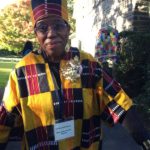
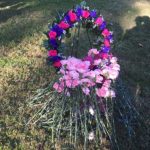
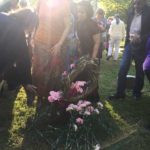
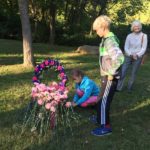
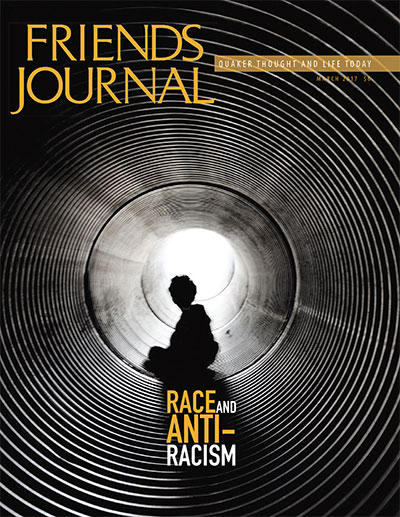
Why is their a reluctance to name the individuals who are quoted? Why must the persons remain anonymous? What is there to hie?
Sorry for the mis-types. I didn’t proofread my comments thoroughly.
“their” should be “there, and “hie” should be “hide”
The lack of names of committee members comes down to an omission on my part, done in error, and a few Friends have raised this omission with me and with other committee members.
I serve as clerk of the committee for Honoring Those Known Only To God and take responsibility. I had been expecting a request for bios from FJ, and the request for bios never came because of miscommunication/misunderstanding. The editor for the piece and I are working on a correction to be added to the article as soon as possible.
As for the anonymous quotes within the article itself, what is important is the ministry and not the Friend who offered it.
Thanks to those Friends and readers who have been wondering and were willing to ask the question.
Liz Oppenheimer
Clerk, Committee for Honoring Those Known Only To God
Thank you all for following this leading to wherever it takes you. I appreciate the queries and have been moved by the one event I was able to attend. May this ministry grow and continue to build bridges as it raises awareness.
I, too, questioned the omission of the names of Friends in this article, particularly the omission of Avis Wanda McClinton, whose ministry is at the heart of this work. Although her unnamed picture is provided, her work in this ministry is not given any attention. In light of this project’s intention being to honor those known only to God, I must stringently disagree with the statement that “what is important is the ministry and not the Friend who offered it.” Not specifically acknowledging Avis’s ministry as an integral part of seeing this project grow from an idea to a practice of restoration is erasure of the Friend and her ministry as the catalyst for this work.
The writer is intentional about ensuring readers understand that the committee is multi-racial and class diverse. Why? Are we to take the writer’s word because the pictures nor the quotes speak to this being multi-racial (unless you literally mean “more than one” for multi as opposed to “many”). I attended the ceremony, which was multi-racial, although these pictures fail to show that. I traveled from Memphis, TN to participate in this ceremony because of my relationship with Avis and my desire to honor the ancestors of African descent who are buried there–not because of the Honoring Project, which I’d never heard of before this article. My invitation to participate in this work came from Avis and not the Honoring Project. Erasing her and her ministry by burying her/it within the project as just another anonymous committee member is unacceptable.
It is easy for Friends of privilege to lift up the ministry over the one who delivers it because they already have a secure and unspoken presence, power and position that are not difficult to find, rarely questioned and not easily shared or relinquished. Friends of Color find few people of color in Meetings with whom we can connect and look to as examples of what Quakerism looks like in practice in our lives as marginalized people. Don’t erase us in the name of lifting up ministry or presenting a false view of inclusiveness and diversity. We will not be those known only by God in this life or the next.
Here is the roster of committee members and their respective monthly/yearly meetings. It took me some time to confirm everyone’s meeting affiliation.
Avis Wanda McClinton, Upper Dublin Monthly Meeting (PA), Philadelphia Yearly Meeting
Joe Coscia and Tricia Coscia, Yardley Friends Meeting (PA), Philadelphia Yearly Meeting
Linda Lotz, Haddonfield Meeting (NJ), Philadelphia Yearly Meeting
Elizabeth (Liz) Oppenheimer, Laughing Waters Friends Preparative Meeting (MN), Iowa Yearly Meeting Conservative
Sarah Yvonne Blackburn Kehoe, Chena Ridge Friends Meeting (AK), Alaska Friends Conference
Tom Grabe, Germantown Meeting (PA), Philadelphia Yearly Meeting
We are expecting FJ to make a correction and list the committee membership soon.
I posed several questions about issues of race and racism that were specific to this article and that also have implications for the wider Quaker community. I am heartened that a discussion between members of the Honoring Project Committee and me ensued that reflected two of the advices provided by the writer. Those advices are #2 Honor and connect directly with individuals who express concerns. Listen and practice nondefensiveness. Remember that no group is monolithic; no individual group member speaks for the entire group and #5 Be sensitive to what people of color are or aren’t willing to share with us. Sometimes, white Friends must educate ourselves on issues; other times, white Friends must simply risk doing what is right and be open to challenge and feedback from people of color later. Again, practice nondefensiveness.
Our discussion included an analysis of intent versus impact and agreements about restorative and transformative steps to be taken to address the issues that were raised. Those steps include publishing articles in Friends Journal that illuminate the need to respect, honor, and center the voices of Friends of Color in a manner that allows Friends of Color to speak their truth–the truth–without fear of backlash or alienation from other Friends; a review of the Friends Journal editorial policies and practices as well as the racial makeup of the editorial staff with respect to the voices and representation of Friends of Color; and a review of the racial makeup of the Honoring Project Committee.
Because of this discussion, I believe changes can be effected that embody the Quaker testimonies of community and equality. I expect and eagerly anticipate these same testimonies being embodied in this work going forward.
We find in the south that the term “colored” was used for non-Whites who were not Negro. This nomenclature probably dated to the 18th century and, regarding official records, certainly dates to the 19th century. By the 20th century, some southern counties had three school districts; Negro, Colored, and White. Many Native American peoples fought mightily to be labeled “Colored” because schools and materials were marginally better for Colored schools than for Negro schools. Also, at least in NC, Quakers from earliest times (17th century) sheltered and abided with Native peoples.Though there is yet to be found much documentary proof of the special relationship there are oral traditions among the Occaneechi people that their band moved to Ohio and Indiana with their Quaker friends in the second decade of the 19th century. I say this solely to raise a question about what “COL” meant in the time and place of its first use.